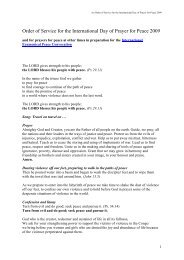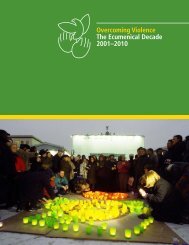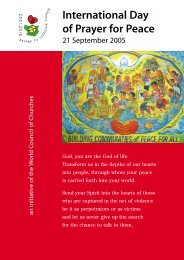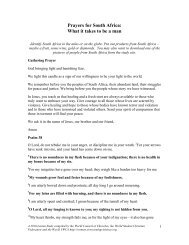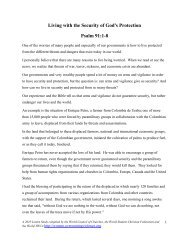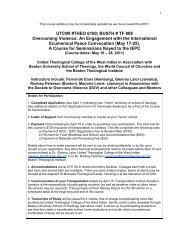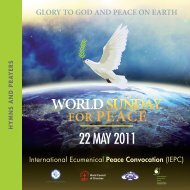Alternative Globalization Addressing Peoples and Earth
Alternative Globalization Addressing Peoples and Earth
Alternative Globalization Addressing Peoples and Earth
Create successful ePaper yourself
Turn your PDF publications into a flip-book with our unique Google optimized e-Paper software.
• Can excessive wealth be defined as concretely as we sometimes define<br />
poverty?<br />
• Is there a wealth line above which no one should rise just as there is<br />
a poverty line below which no one should be allowed to fall?<br />
• Can we speak of “relative wealth” in a way we speak of “relative<br />
poverty”, so focussing once again on unacceptable disparities within<br />
countries <strong>and</strong> communities, rich or poor, as well as between them?<br />
• What might be the indicators of excessive wealth to st<strong>and</strong> alongside<br />
poverty indicators like income per capita for example or infant<br />
mortality rates, where governments <strong>and</strong> international institutions<br />
are encouraged to monitor <strong>and</strong> report both?<br />
The proposals given included the “2015 Millenium goals for the churches<br />
- a call to action”. Some churches like the Evangelical Church in Hessen<br />
<strong>and</strong> Nassau have taken this study, adapted it <strong>and</strong> prepared the study for<br />
the German situation (see www.woek.de “Reichtum und Armut” ).<br />
Women’s voices on alternative globalization addressing people <strong>and</strong> earth,<br />
August 2004<br />
The consultation, which brought together more than 35 church women,<br />
feminist economists <strong>and</strong> activists from the global South, aimed to provide<br />
a space for women to contribute <strong>and</strong> assess their initiatives in the<br />
continuing search for alternatives to globalization, thereby ensuring that<br />
women’s perspectives are brought to bear on the AGAPE message to the<br />
2006 WCC assembly in Porto Alegre, Brazil. The consultation drafted a<br />
“Call to transformative reflection <strong>and</strong> action” addressed to churches<br />
worldwide, that suggested a vision for a more just, sustainable <strong>and</strong> caring<br />
global economy. The Call also produced a commitment for church women<br />
in partnership with feminist economists <strong>and</strong> women’s organizations to<br />
continue to monitor trade <strong>and</strong> financial policies, to carefully study their<br />
impacts at the grassroots level, <strong>and</strong> to network, mobilize <strong>and</strong> advocate for<br />
economic systems, institutions <strong>and</strong> policies that, above all, support <strong>and</strong><br />
uphold the sacred nature of life <strong>and</strong> all creation.<br />
North American churches’ consultation on just trade: Stony Point,<br />
January 2004.<br />
“What does God require of us?” churches in North America asked at this<br />
consultation. Coming out of the meeting, a declaration for just trade in<br />
the service of an economy of life says: “We work for just trade because of<br />
justice of God. God’s justice creates <strong>and</strong> sustains the conditions of life…<br />
What does God require of us? Act justly, love tenderly <strong>and</strong> walk humbly<br />
with our God.” “The economy of God is an economy of life that promotes<br />
sharing, globalizing solidarity, dignity of persons, forgiveness as well as love<br />
55




